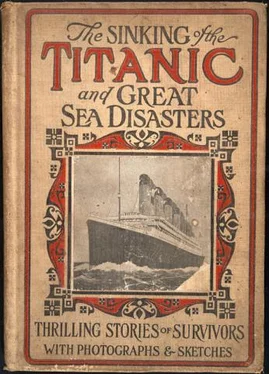Logan Marshall - Sinking of the Titanic and Great Sea Disasters
Здесь есть возможность читать онлайн «Logan Marshall - Sinking of the Titanic and Great Sea Disasters» весь текст электронной книги совершенно бесплатно (целиком полную версию без сокращений). В некоторых случаях можно слушать аудио, скачать через торрент в формате fb2 и присутствует краткое содержание. Год выпуска: 1912, Жанр: Прочая документальная литература, на английском языке. Описание произведения, (предисловие) а так же отзывы посетителей доступны на портале библиотеки ЛибКат.
- Название:Sinking of the Titanic and Great Sea Disasters
- Автор:
- Жанр:
- Год:1912
- ISBN:нет данных
- Рейтинг книги:4.5 / 5. Голосов: 2
-
Избранное:Добавить в избранное
- Отзывы:
-
Ваша оценка:
- 100
- 1
- 2
- 3
- 4
- 5
Sinking of the Titanic and Great Sea Disasters: краткое содержание, описание и аннотация
Предлагаем к чтению аннотацию, описание, краткое содержание или предисловие (зависит от того, что написал сам автор книги «Sinking of the Titanic and Great Sea Disasters»). Если вы не нашли необходимую информацию о книге — напишите в комментариях, мы постараемся отыскать её.
’s demise!
Sinking of the Titanic and Great Sea Disasters — читать онлайн бесплатно полную книгу (весь текст) целиком
Ниже представлен текст книги, разбитый по страницам. Система сохранения места последней прочитанной страницы, позволяет с удобством читать онлайн бесплатно книгу «Sinking of the Titanic and Great Sea Disasters», без необходимости каждый раз заново искать на чём Вы остановились. Поставьте закладку, и сможете в любой момент перейти на страницу, на которой закончили чтение.
Интервал:
Закладка:
“Please report me as saved.”
“What name?” was asked. She shouted a name that could not be understood, and, apparently believing that it had been, turned away again and disappeared.
“Nearly all of us are very ill,” cried another woman. Here several other tugboats appeared, and those standing at the railing were besieged with questions.
“Did the crash come without warning?” a voice on one of the smaller boats megaphoned.
“Yes,” a woman answered. “Most of us had retired. We saved a few of our belongings.”
“How long did it take the boat to sink?” asked the voice.
“Not long,” came the reply? “The crew and the men were very brave. Oh, it is dreadful—dreadful to think of!”
“Is Mr. John Jacob Astor on board?”
“No.”
“Did he remain on the Titanic after the collision?”
“I do not know.”
Questions of this kind were showered at the few survivors who stood at the railing, but they seemed too confused to answer them intelligibly, and after replying evasively to some they would disappear.
“Are you going to anchor for the night?” Captain Rostron was asked by megaphone as his boat approached Ambrose Light. It was then raining heavily.
“No,” came the reply. “I am going into port. There are sick people on board.”
“We tried to learn when she would dock,” said Dr. Walter Kennedy, head of the big ambulance corps on the mist-shrouded pier, “and we were told it would not be before midnight and that most probably it would not be before dawn to-morrow. The childish deception that has been practiced for days by the people who are responsible for the Titanic has been carried up to the very moment of the landing of the survivors.”
She proceeded past the Cunard pier, where 2000 persons were waiting her, and steamed to a spot opposite the White Star piers at Twenty-first Street.
The ports in the big inclosed pier of the Cunard Line were opened, and through them the waiting hundreds, almost frantic with anxiety over what the Carpathia might reveal, watched her as with nerve-destroying leisure she swung about in the river, dropping over the life-boats of the Titanic that they might be taken to the piers of the White Star Line.
It was dark in the river, but the lowering away of the life-boats could be seen from the Carpathia’s pier, and a deep sigh arose from the multitude there as they caught this first glance of anything associated with the Titanic.
Then the Carpathia started for her own pier. As she approached it the ports on the north side of pier 54 were closed that the Carpathia might land there, but through the two left open to accommodate the forward and after gangplanks of the big liner the watchers could see her looming larger and larger in the darkness till finally she was directly alongside the pier.
As the boats were towed away the picture taking and shouting of questions began again. John Badenoch, a buyer for Macy & Co., called down to a representative of the firm that neither Mr. nor Mrs. Isidor Straus were among the rescued on board the Carpathia. An officer of the Carpathia called down that 710 of the Titanic’s passengers were on board, but refused to reply to other questions.
The heavy hawsers were made fast without the customary shouting of ship’s officers and pier hands. From the crowd on the pier came a long, shuddering murmur. In it were blended sighs and hundreds of whispers. The burden of it all was: “Here they come.”
About each gangplank a portable fence had been put in place, marking off some fifty feet of the pier, within which stood one hundred or more customs officials. Next to the fence, crowded close against it, were anxious men and women, their gaze strained for a glance of the first from the ship, their mouths opened to draw their breaths in spasmodic, quivering gasps, their very bodies shaking with suppressed excitement, excitement which only the suspense itself was keeping in subjection.
These were the husbands and wives, children, parents, sweethearts and friends of those who had sailed upon the Titanic on its maiden voyage.
They pressed to the head of the pier, marking the boats of the wrecked ship as they dangled at the side of the Carpathia and were revealed in the sudden flashes of the photographers upon the tugs. They spoke in whispers, each group intent upon its own sad business. Newspaper writers, with pier passes showing in their hat bands, were everywhere.
A sailor hurried outside the fence and disappeared, apparently on a mission for his company. There was a deep-drawn sigh as he walked away, shaking his head toward those who peered eagerly at him. Then came a man and woman of the Carpathia’s own passengers, as their orderly dress showed them to be.
Again a sigh like a sob swept over the crowd, and again they turned back to the canopied gangplank.
Several minutes passed and then out of the first cabin gangway; tunneled by a somber awning, streamed the first survivors. A young woman, hatless, her light brown hair disordered and the leaden weight of crushing sorrow heavy upon eyes and sensitive mouth, was in the van. She stopped, perplexed, almost ready to drop with terror and exhaustion, and was caught by a customs official.
“A survivor?” he questioned rapidly, and a nod of the head answering him, he demanded:
“Your name.”
The answer given, he started to lead her toward that section of the pier where her friends would be waiting.
When she stepped from the gangplank there was quiet on the pier. The answers of the woman could almost be heard by those fifty feet away, but as she staggered, rather than walked, toward the waiting throng outside the fence, a low wailing sound arose from the crowd.
“Dorothy, Dorothy!” cried a man from the number. He broke through the double line of customs inspectors as though it was composed of wooden toys and caught the woman to his breast. She opened her lips inarticulately, weakly raised her arms and would have pitched forward upon her face had she not been supported. Her fair head fell weakly to one side as the man picked her up in his arms, and, with tears streaming down his face, stalked down the long avenue of the pier and down the long stairway to a waiting taxicab.
The wailing of the crowd—its cadences, wild and weird—grew steadily louder and louder till they culminated in a mighty shriek, which swept the whole big pier as though at the direction of some master hand.
The arrival of the Carpathia was the signal for the most sensational rumors to circulate through the crowd on the pier.
First, Mrs. John Jacob Astor was reported to have died at 8.06 o’clock, when the Carpathia was on her way up the harbor.
Captain Smith and the first engineer were reported to have shot themselves when they found that the Titanic was doomed to sink. Afterward it was learned that Captain Smith and the engineer went down with their ship in perfect courage and coolness.
Major Archibald Butt, President Taft’s military aide, was said to have entered into an agreement with George D. Widener, Colonel John Jacob Astor and Isidor Straus to kill them first and then shoot himself before the boat sank. It was said that this agreement had been carried out. Later it was shown that, like many other men on the ship, they had gone down without the exhibition of a sign of fear.
Magistrate Cornell’s wife and her two sisters were among the first to leave the ship. They were met at the first cabin pier entrance by Magistrate Cornell and a party of friends. None of the three women had hats. One of those who met them was Magistrate Cornell’s son. One of Mrs. Cornell’s sisters was overheard to remark that “it would be a dreadful thing when the ship began really to unload.”
Читать дальшеИнтервал:
Закладка:
Похожие книги на «Sinking of the Titanic and Great Sea Disasters»
Представляем Вашему вниманию похожие книги на «Sinking of the Titanic and Great Sea Disasters» списком для выбора. Мы отобрали схожую по названию и смыслу литературу в надежде предоставить читателям больше вариантов отыскать новые, интересные, ещё непрочитанные произведения.
Обсуждение, отзывы о книге «Sinking of the Titanic and Great Sea Disasters» и просто собственные мнения читателей. Оставьте ваши комментарии, напишите, что Вы думаете о произведении, его смысле или главных героях. Укажите что конкретно понравилось, а что нет, и почему Вы так считаете.












